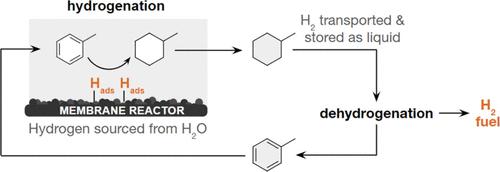当前位置:
X-MOL 学术
›
ACS Energy Lett.
›
论文详情
Our official English website, www.x-mol.net, welcomes your
feedback! (Note: you will need to create a separate account there.)
Electrochemical Hydrogenation of a Liquid Organic Hydrogen Carrier Using a Pd Membrane Reactor
ACS Energy Letters ( IF 19.3 ) Pub Date : 2024-08-20 , DOI: 10.1021/acsenergylett.4c01417 Mia D. Stankovic, Natalie E. LeSage, Jessica F. Sperryn, Aiko Kurimoto, Curtis P. Berlinguette
ACS Energy Letters ( IF 19.3 ) Pub Date : 2024-08-20 , DOI: 10.1021/acsenergylett.4c01417 Mia D. Stankovic, Natalie E. LeSage, Jessica F. Sperryn, Aiko Kurimoto, Curtis P. Berlinguette

|
Liquid organic hydrogen carriers (LOHCs) store hydrogen in the chemical bonds of organic molecules. Unsaturated molecules, like toluene, can store hydrogen at densities comparable to compressed gas, but have the distinct advantage of being transportable as liquids under ambient conditions. Thermochemical hydrogenation using H2(g) requires high temperatures and pressures, whereas electrochemical hydrogenation can proceed at ambient conditions and without H2(g). However, the electrochemical hydrogenation of toluene is limited by the low solubility of toluene (<6 mM) in water. Here, we demonstrate the hydrogenation of neat liquid toluene electrochemically by using a palladium membrane reactor. We show that this reactor prevents toluene permeation to the anode chamber, which is a persistent issue for other forms of electrochemical hydrogenation. This paper outlines how the membrane reactor also overcomes many other issues associated with electrochemical hydrogenation, thereby enabling the hydrogenation of LOHCs without H2(g).
中文翻译:

使用 Pd 膜反应器对液体有机氢载体进行电化学氢化
液态有机氢载体(LOHC)将氢储存在有机分子的化学键中。不饱和分子,如甲苯,可以以与压缩气体相当的密度储存氢气,但具有在环境条件下可作为液体运输的独特优势。使用H 2(g) 的热化学氢化需要高温和高压,而电化学氢化可以在环境条件下并且在没有H 2(g) 的情况下进行。然而,甲苯的电化学氢化受到甲苯(<6 mM)在水中的低溶解度的限制。在这里,我们演示了使用钯膜反应器对纯液体甲苯进行电化学氢化。我们证明该反应器可以防止甲苯渗透到阳极室,这是其他形式的电化学氢化的一个持续存在的问题。本文概述了膜反应器如何克服与电化学氢化相关的许多其他问题,从而能够在没有 H 2(g) 的情况下实现 LOHC 的氢化。
更新日期:2024-08-20
中文翻译:

使用 Pd 膜反应器对液体有机氢载体进行电化学氢化
液态有机氢载体(LOHC)将氢储存在有机分子的化学键中。不饱和分子,如甲苯,可以以与压缩气体相当的密度储存氢气,但具有在环境条件下可作为液体运输的独特优势。使用H 2(g) 的热化学氢化需要高温和高压,而电化学氢化可以在环境条件下并且在没有H 2(g) 的情况下进行。然而,甲苯的电化学氢化受到甲苯(<6 mM)在水中的低溶解度的限制。在这里,我们演示了使用钯膜反应器对纯液体甲苯进行电化学氢化。我们证明该反应器可以防止甲苯渗透到阳极室,这是其他形式的电化学氢化的一个持续存在的问题。本文概述了膜反应器如何克服与电化学氢化相关的许多其他问题,从而能够在没有 H 2(g) 的情况下实现 LOHC 的氢化。































 京公网安备 11010802027423号
京公网安备 11010802027423号